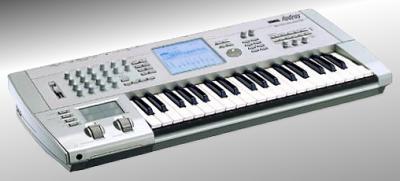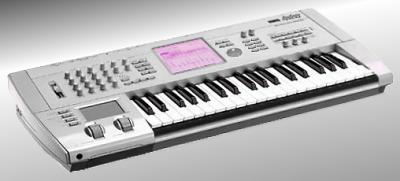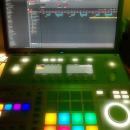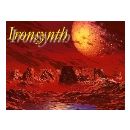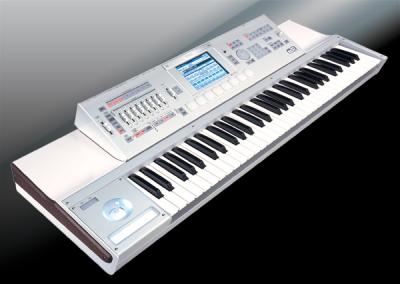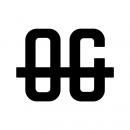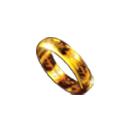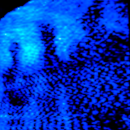Señores estamos ante la nueva era de workstations de korg , y con KARMA incluido :
http://korg.com/geACCESSORIESACCESSORIESDANCE & DJ TOOLSDANCE & DJ TOOLSKEYBOARDS & MODULESKEYBOARDS & MODULESRECORDINGRECORDINGSOFTWARE & CONTROLLERSSOFTWARE & CONTROLLERSTONEWORKSTONEWORKSTUNERS & METRONOMESTUNERS & METRONOMESFEATURESFEATURESARCHIVESARCHIVES
dThe Next Coming of M
The M3 heralds the third generation of Korg Workstations. The M1 started it all, first appearing in 1988 to bring the world a new concept called the "music workstation." It went on to become the best selling workstation in history, and was further expanded and enhanced through the T and O1/W series. Trinity defined a new level of innovations including touch screen technology and configurable effects, and was the forbearer of the successful TRITON range of products.
Now Korg is poised to refine the
workstation category once again.
The M3 features a number of innovations distilled from the flagship OASYS including the new EDS (Enhanced Definition Synthesis) sound generator derived from the HD-1 engine design, the advanced second-generation KARMA functionality, and the multi-purpose control surface. Adding innovations such as the new concept of "virtualized hardware" that allows an even closer integration with DAW systems, Drum Tracks which provide a instant groove to play along with, and the new "Korg Komponent System" concept that facilitates more flexible system construction, the M3 music workstation/sampler opens a new and exciting page in music making, and is the workstation that rightfully deserves to wear the "M" that started it all.
Top Next
Enhanced Definition Synthesis --- a new horizon of sound-making potential
The M3 features a newly developed "EDS" sound generating system based on a new chip design that was developed in parallel with the HD-1 engine from the flagship OASYS. It takes full advantage of the M3’s 256 Mbytes of PCM source material which is a veritable "best of" from the OASYS.
Program Main Page
Using Korg’s advanced voicing technology, the 1,028 multisamples, 1,606 drum samples, dual oscillators, four-level velocity switching/crossfading/layering, and stereo sampling allow for an enormous range of high-quality, detailed, and expressive sounds.
Oscillator Main Page
The filter section, a vital part of the sound-creation process, lets you simultaneously use two resonant filters for each oscillator, and can be configured in series or parallel. Four filter types are provided: low-pass, high-pass, band-pass, and band-reject.
Filter Main Page
The amp section features a driver circuit that gives the sound a sense of edge and character, along with low boost to help shake the walls when needed. Integrated 3-band EQ allows tonal sculpting without needing to go to the effects section. Detailed envelope generators, abundant modulation routings, plus the all-new AMS Mixers for advanced processing all combine to provide a level of sound shaping far beyond previous possibilities.
AMS Mixer Page
Previous Top Next
Effects
The all-important effect section provides up to five Insert effects, two Master effects, and one Total effect. In addition to great chorus/flanger/phasers, delays and reverbs, the 170 effect types include dynamics-type effects such as compressor and limiter, amp modeling and speaker simulation effects using Korg’s proprietary "REMS" modeling technology, and evocative effects like the Grain Shifter and Talking Modulator.
Insert Effects Setup Page
Master/Total Effects Routing Page
The M3 includes professional features that allow for many cool applications and routings. Dual Common LFOs allow multiple effects to use the same modulation source; an advanced Control Bus provides triggering input from external audio or internal timbres to effects such as compressor/limiters and the vocoder; and the audio inputs can be freely routed to various effect chains and then run to individual outputs allowing the M3 to be used as a 2-in/6-output effects processor.
Previous Top Next
Funky Drummer
A drumkit in the M3 can be created from ROM or RAM samples, mono or stereo, with up to four-way velocity switching and cross-fading for incredible realism.
Drumkit Main Page
Drumkit Velocity Split Page
Powerful sound shaping can occur here, with EQ, drive and low boost plus individual effects routing per key, delivering incredible results.
Drumkit Drive/EQ Page
The M3 provides a new Drum Track function in Program and Combi modes that adds a groove to each sound you play. Combined with KARMA it makes even a Program a complete sonic adventure that is sure to inspire. You can select patterns from over 500 in internal memory and start them from a desired region of the keyboard or by playing a velocity that’s above a specified threshold.
Since the Drum Track uses MIDI data stored in a Pattern, it is easy for you to create your own in the Sequencer Mode, either recording them, importing them from SMF data or other user’s songs, or converting recorded KARMA data as MIDI events for further manipulation. Even sampled loops can be used! This is a powerful feature for uses ranging from creating music-production memos to realtime performance.
Drum Track Setup Page
Drum Track Program Page
Previous Top Next
Expanded Combination Mode
Combination Mode is where multiple Programs can be freely assigned as splits and layers across the keyboard, including velocity switching and cross-fading for complex and expressive sounds. Sounds can be delayed either by time or by tempo, even when you release a key, allowing you to create sophisticated rhythmic soundscapes and performance effects. Monophonic sounds can be forced to be polyphonic, or vice-versa, and you can select only one of the oscillators if desired. For the more adventurous musician, each timbre can even use a different scale or tuning!
The M3 allows for sixteen timbres at the same time, along with a Drum Track, up to four KARMA Modules, multiple effects and much more. Each timbre has dedicated 3-band EQ for getting the perfect mix, and a powerful Tone Adjust setup for detailed in-context sound shaping.
Combination Mode Main Page
In addition to providing more sound elements, this means that Combis can be set up and saved as complete 16-part MIDI sequencing templates for use with an external sequencer and computer DAWs.
Previous Top Next
Great sounds
In the end it’s always about the sounds, and the M3 doesn’t disappoint. Korg’s acclaimed international voicing team delivers the goods once again. Stunningly realistic imitative sounds, fat synth sounds, imaginative textures, evocative sounds effects – it’s all here. The M3 comes loaded with 512 Programs, and room for a total of 1,664 user sounds (13 Banks plus GM). All sound locations are fully editable (except GM banks), so you are always free to tweak a sound if needed. Adding in the EXB-RADIAS delivers 128 powerful MMT synthesis sounds. There are 32 drumkits provided, and room for a total of 144. As for the 16-part Combinations, 384 come preloaded, with room for a total of 1,792 (14 Banks).
All sounds (Programs and Combinations) are organized by Categories for easy searching and selection. With both overall categories and sub-categories it’s easy to search for and organize your sounds.
Previous Top Next
2nd Generation KARMA
The second generation KARMA functionality that first appeared on the OASYS and received acclaim from artists and users world-wide is also provided. KARMA is the inspiring, real-time phrase generator that can help you play everything from natural instrument gestures like intricate finger-picking, strumming and harp glissandos, to complex cascades of notes, dance-riffs, gated and chopping effects and "improvising" drum grooves. The inspiration that KARMA offers, coupled with the unheard-of phrase variability is second to none.
In Program Mode, one KARMA Generated Effect (GE) can be assigned to a single drum groove, melodic phrase, comping gated part or other musical effect. Eight sliders, eight switches, and eight scene buttons (two settings of four) provide dedicated real-time control and the ability to store complete snapshots of your settings.
In Combi and Sequencer modes, KARMA’s power increases exponentially, with four KARMA Modules available simultaneously.
The Control Surface can access and manipulate each module individually on its own "Module Layer". In addition to the four individual Module Layers, there is a Master Layer that can be mapped to parameters from any of the modules, even grouping them together – so one slider can control the swing feel of all four modules at the same time, or the rhythmic activity of two or three modules at once, to name a few. Each Module Layer has 8 Scenes that store the settings of the sliders and switches in 8 different snapshots, instantly recalling completely different settings for that layer.
The Master Layer’s 8 Scenes, in addition to storing the settings of the 16 sliders and switches for its parameters, also control which scene is selected for each module. You can control each layer’s scenes directly from the control surface, or from the innovative Scene Matrix Page, which also controls whether the Drum Track will play along in a given scene. With 8 Scenes in each Module, and 8 Master Scenes storing which of those scenes are selected at which time (a total of 40 scenes), the possibilities are mind-boggling.
The M3 has incredible control over each KARMA element yet has been refined to be even easier to use, thanks to 13 "Real-Time Control Models" (RTC Models). An RTC Model standardizes which parameters of a KARMA GE are available for real time control, and how they are assigned to the Control Surface. With multiple GEs sharing the same exact setup, what you learn while controlling one GE is consistent and applicable to other GEs as well.
Finally, the second generation KARMA provides a signature sonic effect called KARMA Wave-Sequencing that can change a sound’s waveforms rhythmically in realtime, along with everything else KARMA is doing, allowing each note to access a different waveform as it is generated. The results can resemble traditional wave-sequencing, or enter completely new realms of sound design.
KARMA (Kay Algorithmic Realtime Music Architecture) is a trademark representing patented technology licensed from Stephen Kay, Karma Lab LLC,
http://www.karma-lab.com
Sounds processed with INFINITY software.
Features and specifications are subject to change without notice.
Previous Top Next
Ultimate expressive power
The M3 is remarkable not only for the freshness of its sounds, but also for its outstanding new control environment. The color LCD of the M3 music workstation/sampler not only provides a touch-view GUI that ensures intuitive and easy operation, but it also operates as an X-Y Pad, allowing sound and effect parameters to be controlled in real-time by sliding your finger across or tapping on the screen. Further control is provided by a Motion function that lets you capture and play back your finger moves to shape your sound and performance in unique ways. The screen even changes colors in response to the movement of your finger for cool visual feedback to your performance.
The eight dynamic pads give you a great way to play drum sounds or up to 8-note chords, either live or as triggers for the powerful KARMA function.
Each note in the chord retains the individual velocity so it can play back with all the nuance of your original performance, and can even be scaled across a full velocity range without "breaking" the dynamic relationship of each note.
Pads 1-8 Assignment Page
The eight slider/switch control surface offers the same multi-functionality as on the OASYS: it can be used as a mixer, a set of expressive sound controls, an editing interface, a realtime KARMA performance interface, or to control external software and hardware synths and effects.
Control Surface Mixer Page
Control Surface Real Time Control Page
Control Surface Tone Adjust Page
Control Surface KARMA RT Control Page
There’s also a joystick, assignable Value slider, two switches and a ribbon controller that give you convenient ways to express subtle nuances of sound. A newly designed proprietary keyboard with refined aftertouch delivers superb feel and expression that’s better than ever before.
Previous Top Next
RADIAS inside
You can add an internal RADIAS analog modeling synthesizer sound generator board (one timbre, up to 24 voices), with on-screen integration of all its parameters and full integration with the M3’s effects, control surface and KARMA functionality.
EXB-RADIAS Main Page
This powerful MMT-based (Multiple Modeling Technology) synth engine features dual oscillators which combine to offer analog-modeled waves, DWGS (PCM) waves, noise, ring mod and more. Waveform modulation, Variable Phase Modulation (VPM), Unison voice thickening, PWM and cross-mod expand the sonic palette.
EXB-RADIAS Oscillator Main Page
Dual Filters can run in series, parallel, or side by side (individual for each oscillator). Filter1 features a resonant filter design covering 24 dB low pass, 12 dB low pass plus 12 dB high and band pass, with continuously variable "morphing" between these states. Filter2 offers 12dB versions of the low, high and band pass modes, plus a unique comb filter.
EXB-RADIAS Filter Page
Two LFOs and three ADSR envelopes shape the sound and add cyclic motion to nearly any voice parameter. Three 16-step Modulation Sequencers provide discrete values to a modulation parameter that change over time, either in stepped or smooth motion, and can loop over and over.
EXB-RADIAS Mod Sequencer Page
Internal or external audio can be run through the EXB-RADIAS to be gated and filtered using the internal synthesis and effects. Drive adds analog warmth, Punch brings increased definition to the attack of a sound, and 12-types of Wave Shaping provides dramatic timbral shaping – even offering virtual "pick-up" response.
The EXB-RADIAS offers the same vocoder as the RADIAS, offering 16 bands with individual control over level and panning. Formant Motion records the formant of a sung or spoken phrase so it can be recreated anytime.
EXB-RADIAS Vocoder Main Page
EXB-RADIAS Vocoder Page 2
And of course, all of KARMA’s generative features can be used with the RADIAS to provide even more options, including RADIAS Wave-Sequencing.
Previous Top Next
Open Sampling
The M3’s Open Sampling System lets you sample and resample in any mode to produce new remixed combinations of sounds and effects, or to capture full performances "In-Track" within the sequencer.
Cutting-edge editing tools include Time Slice, Time Stretch, Crossfade Looping, Rate Change and Normalize.
An easy-to-use Auto-Setup function makes all the right sampling settings for you, with the press of a button. Stock sampling memory is 64 MB, and can be increased to 320 MB by adding the optional EXB-M256 memory expansion board. Samples in Korg native format, AIFF, WAV, Soundfont V2.0 and AKAI (S-1000/3000 with advanced Program parameter conversion) formats can be used, and internal samples can be exported as WAV or AIFF if needed.
Sampling can also be done to attached media, so USB memory sticks and hard drives can be used to extend memory size to resample a complete song as a WAV file to be burned to a USB CD-R/RW as an audio disc, or for moving to a computer for further editing and manipulation. Audio files on the media can even be edited directly to normalize, trim, and perform other essential editing tasks.
Previous Top Next
New High-Resolution Sequencer
The sequencer that’s at the heart of the M3’s song production is an intuitively-understandable 16-track design that holds up to 128 songs and 210,000 notes.
Sequencer Main Page
The new high timing resolution of 480 PPQ captures every nuance and detail of your performance. Three-band EQ per track provides detailed sound-shaping, as does the Tone Adjust sound "tweaking" function.
Sequencer EQ Page
The Cue List function that has been a popular feature ever since the now-classic TRITON series lets you create songs in sections, or play back completed songs as a medley.
Sequence Cue List Page
All the now-classic Korg features are including, such as One-touch setup which takes you from playing a Program or Combination to "ready-to-record" status in one easy step, automatically arming tracks and routing voices behind the scenes.
Song Templates contain pre-assigned effect routings and program assignments, providing one more shortcut to help you capture your creative outbursts. The M3 comes with 16 of these Song Templates, plus another 16 you can custom-tailor to your own needs. Each Template Song also provides a number of rhythm patterns – including intro, fills and endings – that you can use to instantly create a rhythm track.
Individual track looping allows flexible manipulation of repeated phrases such as drum grooves against longer parts like melodies and solos.
Sequencer Play Loop Page
Advanced editing tools like variable quantization with selectable intensity and swing allow for nuanced adjustments to your recordings. Detailed event editing lets you work on your tracks with surgical precision, and a Compare function acts like an Undo for your last change to easily judge the effect of your edits.
Sequencer Event Edit Page
Realtime Pattern Play and Record (RPPR) can be used to assign sequenced Patterns to individual keys on the keyboard for an interactive performance, or to quickly build up tracks.
Time-tested features that have been proven to aid in inspiration and song creation combine to deliver an intuitive and enjoyable songwriting experience – the M3 has it all!
Previous Top Next
Virtualized hardware
In addition to being a highly-developed music workstation, the M3 is also able to closely integrate with your computer. By connecting the M3 to your computer via USB and using the included stand-alone "M3 Editor" software, you can edit sounds and settings from your computer.
A plug-in version of "M3 Editor" is also provided, so you can use it from within your DAW as a plug-in instrument. The editor runs as a VST, AU or RTAS plug-in for maximum compatibility. For even more complete integration, Korg’s new "Virtualized Hardware" concept comes into play. When the optional EXB-FW FireWire board is installed, a single FireWire cable will convey both the M3’s MIDI and audio signals to the tracks of your DAW in which the plug-in is running. This means that you can construct a highly integrated environment that adds the reliability of hardware to your software music production system, adding additional power to your virtual world.
Previous Top Next
Four models
The M3 music workstation/sampler is available as a lineup of four models: 61-key, 73-key, and weighted 88-key models, as well as the module-only M3-M. The 61-key and 73-key models use a proprietary new semi-weighted synth action keyboard developed by Korg for great playing feel and expressive aftertouch response. The 88-key model features the RH3 (Real Weighted Hammer Action 3) keyboard that reproduces the playing sensation of a grand piano, in which the low range has a heavier feel, with the touch becoming lighter as you play upward on the keyboard, allowing superb response to fine movements of your fingers.
Previous Top Next
Korg Komponent System
The M3 music workstation/sampler introduces the new Korg Komponent System, featuring detachable keyboard and sound generator sections. The 61-key model lets you mount a RADIAS-R analog modeling synthesizer instead of the M3-M sound generator, the 73-key model lets you mount the M3-M together with a RADIAS-R analog modeling synthesizer, and the 88-key model supports the combination of M3-M and RADIAS-R or even mounting two M3-M units simultaneously. Of course you can detach the M3-M sound generator and use it as a sound module, giving you great flexibility for constructing the system you need whenever you want.
Previous Top Next
A rich array of input/output jacks
The M3 provides two analog and two digital (S/P DIF) inputs as standard. In addition to the main two-channel output (L/MONO, R), there are four independent outputs as well as two-channel digital output (24-bit optical S/P DIF), meeting the needs of professionals.
Two USB connectors are provided: a type-B USB connector for connection to your computer as a MIDI interface, and dual type-A connectors for connecting external storage media. USB 2.0 is supported to ensure high-speed transfer of large amounts of data.
The optional EXB-FW adds two Firewire ports for conveying both audio and MIDI to your computer, and for daisy-chaining the M3 in your Firewire-based studio setup.
Three pedal inputs are provided, including damper jack support for half-damper sensing. The footswitch and footpedal jacks can be assigned to wide choice of functions including modulation, sostenuto, Program advance, punch-in recording and much more.
For a complete look at the connections and the rear panel, click here to open up the Zoom Tool and then click to toggle the view to show the rear panel.
Previous Top
The Next Coming of M
The M3 heralds the third generation of Korg Workstations. The M1 started it all, first appearing in 1988 to bring the world a new concept called the "music workstation." It went on to become the best selling workstation in history, and was further expanded and enhanced through the T and O1/W series. Trinity defined a new level of innovations including touch screen technology and configurable effects, and was the forbearer of the successful TRITON range of products.
Now Korg is poised to refine the
workstation category once again.
The M3 features a number of innovations distilled from the flagship OASYS including the new EDS (Enhanced Definition Synthesis) sound generator derived from the HD-1 engine design, the advanced second-generation KARMA functionality, and the multi-purpose control surface. Adding innovations such as the new concept of "virtualized hardware" that allows an even closer integration with DAW systems, Drum Tracks which provide a instant groove to play along with, and the new "Korg Komponent System" concept that facilitates more flexible system construction, the M3 music workstation/sampler opens a new and exciting page in music making, and is the workstation that rightfully deserves to wear the "M" that started it all.
Enhanced Definition Synthesis --- a new horizon of sound-making potential
The M3 features a newly developed "EDS" sound generating system based on a new chip design that was developed in parallel with the HD-1 engine from the flagship OASYS. It takes full advantage of the M3’s 256 Mbytes of PCM source material which is a veritable "best of" from the OASYS.
Program Main Page
Using Korg’s advanced voicing technology, the 1,028 multisamples, 1,606 drum samples, dual oscillators, four-level velocity switching/crossfading/layering, and stereo sampling allow for an enormous range of high-quality, detailed, and expressive sounds.
Oscillator Main Page
The filter section, a vital part of the sound-creation process, lets you simultaneously use two resonant filters for each oscillator, and can be configured in series or parallel. Four filter types are provided: low-pass, high-pass, band-pass, and band-reject.
Filter Main Page
The amp section features a driver circuit that gives the sound a sense of edge and character, along with low boost to help shake the walls when needed. Integrated 3-band EQ allows tonal sculpting without needing to go to the effects section. Detailed envelope generators, abundant modulation routings, plus the all-new AMS Mixers for advanced processing all combine to provide a level of sound shaping far beyond previous possibilities.
AMS Mixer Page
Effects
The all-important effect section provides up to five Insert effects, two Master effects, and one Total effect. In addition to great chorus/flanger/phasers, delays and reverbs, the 170 effect types include dynamics-type effects such as compressor and limiter, amp modeling and speaker simulation effects using Korg’s proprietary "REMS" modeling technology, and evocative effects like the Grain Shifter and Talking Modulator.
Insert Effects Setup Page
Master/Total Effects Routing Page
The M3 includes professional features that allow for many cool applications and routings. Dual Common LFOs allow multiple effects to use the same modulation source; an advanced Control Bus provides triggering input from external audio or internal timbres to effects such as compressor/limiters and the vocoder; and the audio inputs can be freely routed to various effect chains and then run to individual outputs allowing the M3 to be used as a 2-in/6-output effects processor.
Funky Drummer
A drumkit in the M3 can be created from ROM or RAM samples, mono or stereo, with up to four-way velocity switching and cross-fading for incredible realism.
Drumkit Main Page
Drumkit Velocity Split Page
Powerful sound shaping can occur here, with EQ, drive and low boost plus individual effects routing per key, delivering incredible results.
Drumkit Drive/EQ Page
The M3 provides a new Drum Track function in Program and Combi modes that adds a groove to each sound you play. Combined with KARMA it makes even a Program a complete sonic adventure that is sure to inspire. You can select patterns from over 500 in internal memory and start them from a desired region of the keyboard or by playing a velocity that’s above a specified threshold.
Since the Drum Track uses MIDI data stored in a Pattern, it is easy for you to create your own in the Sequencer Mode, either recording them, importing them from SMF data or other user’s songs, or converting recorded KARMA data as MIDI events for further manipulation. Even sampled loops can be used! This is a powerful feature for uses ranging from creating music-production memos to realtime performance.
Drum Track Setup Page
Drum Track Program Page
Expanded Combination Mode
Combination Mode is where multiple Programs can be freely assigned as splits and layers across the keyboard, including velocity switching and cross-fading for complex and expressive sounds. Sounds can be delayed either by time or by tempo, even when you release a key, allowing you to create sophisticated rhythmic soundscapes and performance effects. Monophonic sounds can be forced to be polyphonic, or vice-versa, and you can select only one of the oscillators if desired. For the more adventurous musician, each timbre can even use a different scale or tuning!
The M3 allows for sixteen timbres at the same time, along with a Drum Track, up to four KARMA Modules, multiple effects and much more. Each timbre has dedicated 3-band EQ for getting the perfect mix, and a powerful Tone Adjust setup for detailed in-context sound shaping.
Combination Mode Main Page
In addition to providing more sound elements, this means that Combis can be set up and saved as complete 16-part MIDI sequencing templates for use with an external sequencer and computer DAWs.
Great sounds
In the end it’s always about the sounds, and the M3 doesn’t disappoint. Korg’s acclaimed international voicing team delivers the goods once again. Stunningly realistic imitative sounds, fat synth sounds, imaginative textures, evocative sounds effects – it’s all here. The M3 comes loaded with 512 Programs, and room for a total of 1,664 user sounds (13 Banks plus GM). All sound locations are fully editable (except GM banks), so you are always free to tweak a sound if needed. Adding in the EXB-RADIAS delivers 128 powerful MMT synthesis sounds. There are 32 drumkits provided, and room for a total of 144. As for the 16-part Combinations, 384 come preloaded, with room for a total of 1,792 (14 Banks).
All sounds (Programs and Combinations) are organized by Categories for easy searching and selection. With both overall categories and sub-categories it’s easy to search for and organize your sounds.
2nd Generation KARMA
The second generation KARMA functionality that first appeared on the OASYS and received acclaim from artists and users world-wide is also provided. KARMA is the inspiring, real-time phrase generator that can help you play everything from natural instrument gestures like intricate finger-picking, strumming and harp glissandos, to complex cascades of notes, dance-riffs, gated and chopping effects and "improvising" drum grooves. The inspiration that KARMA offers, coupled with the unheard-of phrase variability is second to none.
In Program Mode, one KARMA Generated Effect (GE) can be assigned to a single drum groove, melodic phrase, comping gated part or other musical effect. Eight sliders, eight switches, and eight scene buttons (two settings of four) provide dedicated real-time control and the ability to store complete snapshots of your settings.
In Combi and Sequencer modes, KARMA’s power increases exponentially, with four KARMA Modules available simultaneously.
The Control Surface can access and manipulate each module individually on its own "Module Layer". In addition to the four individual Module Layers, there is a Master Layer that can be mapped to parameters from any of the modules, even grouping them together – so one slider can control the swing feel of all four modules at the same time, or the rhythmic activity of two or three modules at once, to name a few. Each Module Layer has 8 Scenes that store the settings of the sliders and switches in 8 different snapshots, instantly recalling completely different settings for that layer.
The Master Layer’s 8 Scenes, in addition to storing the settings of the 16 sliders and switches for its parameters, also control which scene is selected for each module. You can control each layer’s scenes directly from the control surface, or from the innovative Scene Matrix Page, which also controls whether the Drum Track will play along in a given scene. With 8 Scenes in each Module, and 8 Master Scenes storing which of those scenes are selected at which time (a total of 40 scenes), the possibilities are mind-boggling.
The M3 has incredible control over each KARMA element yet has been refined to be even easier to use, thanks to 13 "Real-Time Control Models" (RTC Models). An RTC Model standardizes which parameters of a KARMA GE are available for real time control, and how they are assigned to the Control Surface. With multiple GEs sharing the same exact setup, what you learn while controlling one GE is consistent and applicable to other GEs as well.
Finally, the second generation KARMA provides a signature sonic effect called KARMA Wave-Sequencing that can change a sound’s waveforms rhythmically in realtime, along with everything else KARMA is doing, allowing each note to access a different waveform as it is generated. The results can resemble traditional wave-sequencing, or enter completely new realms of sound design.
KARMA (Kay Algorithmic Realtime Music Architecture) is a trademark representing patented technology licensed from Stephen Kay, Karma Lab LLC,
http://www.karma-lab.com
Sounds processed with INFINITY software.
Features and specifications are subject to change without notice.
Ultimate expressive power
The M3 is remarkable not only for the freshness of its sounds, but also for its outstanding new control environment. The color LCD of the M3 music workstation/sampler not only provides a touch-view GUI that ensures intuitive and easy operation, but it also operates as an X-Y Pad, allowing sound and effect parameters to be controlled in real-time by sliding your finger across or tapping on the screen. Further control is provided by a Motion function that lets you capture and play back your finger moves to shape your sound and performance in unique ways. The screen even changes colors in response to the movement of your finger for cool visual feedback to your performance.
The eight dynamic pads give you a great way to play drum sounds or up to 8-note chords, either live or as triggers for the powerful KARMA function.
Each note in the chord retains the individual velocity so it can play back with all the nuance of your original performance, and can even be scaled across a full velocity range without "breaking" the dynamic relationship of each note.
Pads 1-8 Assignment Page
The eight slider/switch control surface offers the same multi-functionality as on the OASYS: it can be used as a mixer, a set of expressive sound controls, an editing interface, a realtime KARMA performance interface, or to control external software and hardware synths and effects.
Control Surface Mixer Page
Control Surface Real Time Control Page
Control Surface Tone Adjust Page
Control Surface KARMA RT Control Page
There’s also a joystick, assignable Value slider, two switches and a ribbon controller that give you convenient ways to express subtle nuances of sound. A newly designed proprietary keyboard with refined aftertouch delivers superb feel and expression that’s better than ever before.
RADIAS inside
You can add an internal RADIAS analog modeling synthesizer sound generator board (one timbre, up to 24 voices), with on-screen integration of all its parameters and full integration with the M3’s effects, control surface and KARMA functionality.
EXB-RADIAS Main Page
This powerful MMT-based (Multiple Modeling Technology) synth engine features dual oscillators which combine to offer analog-modeled waves, DWGS (PCM) waves, noise, ring mod and more. Waveform modulation, Variable Phase Modulation (VPM), Unison voice thickening, PWM and cross-mod expand the sonic palette.
EXB-RADIAS Oscillator Main Page
Dual Filters can run in series, parallel, or side by side (individual for each oscillator). Filter1 features a resonant filter design covering 24 dB low pass, 12 dB low pass plus 12 dB high and band pass, with continuously variable "morphing" between these states. Filter2 offers 12dB versions of the low, high and band pass modes, plus a unique comb filter.
EXB-RADIAS Filter Page
Two LFOs and three ADSR envelopes shape the sound and add cyclic motion to nearly any voice parameter. Three 16-step Modulation Sequencers provide discrete values to a modulation parameter that change over time, either in stepped or smooth motion, and can loop over and over.
EXB-RADIAS Mod Sequencer Page
Internal or external audio can be run through the EXB-RADIAS to be gated and filtered using the internal synthesis and effects. Drive adds analog warmth, Punch brings increased definition to the attack of a sound, and 12-types of Wave Shaping provides dramatic timbral shaping – even offering virtual "pick-up" response.
The EXB-RADIAS offers the same vocoder as the RADIAS, offering 16 bands with individual control over level and panning. Formant Motion records the formant of a sung or spoken phrase so it can be recreated anytime.
EXB-RADIAS Vocoder Main Page
EXB-RADIAS Vocoder Page 2
And of course, all of KARMA’s generative features can be used with the RADIAS to provide even more options, including RADIAS Wave-Sequencing.
Open Sampling
The M3’s Open Sampling System lets you sample and resample in any mode to produce new remixed combinations of sounds and effects, or to capture full performances "In-Track" within the sequencer.
Cutting-edge editing tools include Time Slice, Time Stretch, Crossfade Looping, Rate Change and Normalize.
An easy-to-use Auto-Setup function makes all the right sampling settings for you, with the press of a button. Stock sampling memory is 64 MB, and can be increased to 320 MB by adding the optional EXB-M256 memory expansion board. Samples in Korg native format, AIFF, WAV, Soundfont V2.0 and AKAI (S-1000/3000 with advanced Program parameter conversion) formats can be used, and internal samples can be exported as WAV or AIFF if needed.
Sampling can also be done to attached media, so USB memory sticks and hard drives can be used to extend memory size to resample a complete song as a WAV file to be burned to a USB CD-R/RW as an audio disc, or for moving to a computer for further editing and manipulation. Audio files on the media can even be edited directly to normalize, trim, and perform other essential editing tasks.
New High-Resolution Sequencer
The sequencer that’s at the heart of the M3’s song production is an intuitively-understandable 16-track design that holds up to 128 songs and 210,000 notes.
Sequencer Main Page
The new high timing resolution of 480 PPQ captures every nuance and detail of your performance. Three-band EQ per track provides detailed sound-shaping, as does the Tone Adjust sound "tweaking" function.
Sequencer EQ Page
The Cue List function that has been a popular feature ever since the now-classic TRITON series lets you create songs in sections, or play back completed songs as a medley.
Sequence Cue List Page
All the now-classic Korg features are including, such as One-touch setup which takes you from playing a Program or Combination to "ready-to-record" status in one easy step, automatically arming tracks and routing voices behind the scenes.
Song Templates contain pre-assigned effect routings and program assignments, providing one more shortcut to help you capture your creative outbursts. The M3 comes with 16 of these Song Templates, plus another 16 you can custom-tailor to your own needs. Each Template Song also provides a number of rhythm patterns – including intro, fills and endings – that you can use to instantly create a rhythm track.
Individual track looping allows flexible manipulation of repeated phrases such as drum grooves against longer parts like melodies and solos.
Sequencer Play Loop Page
Advanced editing tools like variable quantization with selectable intensity and swing allow for nuanced adjustments to your recordings. Detailed event editing lets you work on your tracks with surgical precision, and a Compare function acts like an Undo for your last change to easily judge the effect of your edits.
Sequencer Event Edit Page
Realtime Pattern Play and Record (RPPR) can be used to assign sequenced Patterns to individual keys on the keyboard for an interactive performance, or to quickly build up tracks.
Time-tested features that have been proven to aid in inspiration and song creation combine to deliver an intuitive and enjoyable songwriting experience – the M3 has it all!
Virtualized hardware
In addition to being a highly-developed music workstation, the M3 is also able to closely integrate with your computer. By connecting the M3 to your computer via USB and using the included stand-alone "M3 Editor" software, you can edit sounds and settings from your computer.
A plug-in version of "M3 Editor" is also provided, so you can use it from within your DAW as a plug-in instrument. The editor runs as a VST, AU or RTAS plug-in for maximum compatibility. For even more complete integration, Korg’s new "Virtualized Hardware" concept comes into play. When the optional EXB-FW FireWire board is installed, a single FireWire cable will convey both the M3’s MIDI and audio signals to the tracks of your DAW in which the plug-in is running. This means that you can construct a highly integrated environment that adds the reliability of hardware to your software music production system, adding additional power to your virtual world.
Four models
The M3 music workstation/sampler is available as a lineup of four models: 61-key, 73-key, and weighted 88-key models, as well as the module-only M3-M. The 61-key and 73-key models use a proprietary new semi-weighted synth action keyboard developed by Korg for great playing feel and expressive aftertouch response. The 88-key model features the RH3 (Real Weighted Hammer Action 3) keyboard that reproduces the playing sensation of a grand piano, in which the low range has a heavier feel, with the touch becoming lighter as you play upward on the keyboard, allowing superb response to fine movements of your fingers.
Korg Komponent System
The M3 music workstation/sampler introduces the new Korg Komponent System, featuring detachable keyboard and sound generator sections. The 61-key model lets you mount a RADIAS-R analog modeling synthesizer instead of the M3-M sound generator, the 73-key model lets you mount the M3-M together with a RADIAS-R analog modeling synthesizer, and the 88-key model supports the combination of M3-M and RADIAS-R or even mounting two M3-M units simultaneously. Of course you can detach the M3-M sound generator and use it as a sound module, giving you great flexibility for constructing the system you need whenever you want.
A rich array of input/output jacks
The M3 provides two analog and two digital (S/P DIF) inputs as standard. In addition to the main two-channel output (L/MONO, R), there are four independent outputs as well as two-channel digital output (24-bit optical S/P DIF), meeting the needs of professionals.
Two USB connectors are provided: a type-B USB connector for connection to your computer as a MIDI interface, and dual type-A connectors for connecting external storage media. USB 2.0 is supported to ensure high-speed transfer of large amounts of data.
The optional EXB-FW adds two Firewire ports for conveying both audio and MIDI to your computer, and for daisy-chaining the M3 in your Firewire-based studio setup.
Three pedal inputs are provided, including damper jack support for half-damper sensing. The footswitch and footpedal jacks can be assigned to wide choice of functions including modulation, sostenuto, Program advance, punch-in recording and much more.
For a complete look at the connections and the rear panel, click here to open up the Zoom Tool and then click to toggle the view to show the rear panel.
Display
• 320 x 240 dot color TouchView™ GUI
Top Next
Control Inputs
Damper Pedal (half damper pedaling supported), Assignable Switch, Assignable Pedal
Previous Top Next
Audio Outputs
• L/MONO, R
• INDIVIDUAL-1, 2, 3, 4
• S/P DIF (optical 24-bit, 48 kHz)
• Headphones
Previous Top Next
Audio Input
• 1, 2 (level switch (MIC/LINE), level knob)
• S/P DIF (optical 24-bit, 48 kHz)
Previous Top Next
MIDI
IN, OUT, THRU
Previous Top Next
Interface
• 2 USB type A connectors(for storage devices)
• USB type B connector (for MIDI interface, USB 2.0 supported)
• 2 FireWire ports (when EXB-FW (separately sold option) installed)
• TO KYBD (for connection to keyboard assembly unit)
Previous Top Next
Current Consumption
35 W
Previous Top Next
Accessories
• AC cord
• CD-ROM (M3 Editor stand alone and plug-in versions)
Previous Top Next
Keyboard Assembly Unit
Keyboard
• 61-key, 73-key (Korg’s new keyboard, semi-weighted), 88-key weighted action (RH3: Real Weighted Hammer Action 3 keyboard)
Controllers
• Joystick, Ribbon Controller, [SW1], [SW2]
Interface
• TO MODULE (for connection to M3-M tone generator module)
• TO MODULE (second) (available on 73-key and 88-key)
Previous Top Next
System Requirements for computer use
Windows
• Microsoft Windows XP Home/Professional Edition Service Pack 2 or later, computer supports Windows XP with USB port (Intel USB Host Controller recommended)
Macintosh
• Mac OS X 10.3.9 or later, Apple Macintosh with USB ports supports Mac OS X 10.3.9 (PowerPC/Intel-based supported)
Previous Top Next
System Requirements for M3 Editor
Windows
• Windows XP Home/ Professional Edition Service Pack 2 or later, Intel Pentium III/1 GHz or faster, 512 Mbyte or larger memory (1 Gbyte or larger recommended)
Macintosh
• Mac OS X 10.3.9 or later, G4/800 MHz or faster (Intel-based Mac supported, G5 and/or Core Duo recommended), 512 Mbyte or larger memory (1 Gbyte or larger recommended)
Plug-in version
• Supported Formats: VST, RTAS, Audio Units (Mac only)
Previous Top Next
M3 Options
• EXB-FW
FireWire Board
• EXB-M256
256 Mbyte Sample Memory Expansion Board
• EXB-RADIAS
RADIAS Synthesizer Board
• EX-USB-PCM series
PCM Expansion USB Memory devices
• XVP-10
EXP/VOL Pedal
• EXP-2
Foot Controller
• DS-1H
Damper Pedal
Previous Top Next
Tone Generator
• 256 Mbyte (when converted to 16-bit linear format)
• 1,028 Multisamples
• 1,606 Drum Samples
Previous Top Next
Sampling
• 16-bit, linear, 48 kHz mono/stereo sampling, resampling available (Open Sampling System)
• 64 Mbyte memory standard (expandable up to 320 Mbyte with EXB-M256 option)
• 1,000 Multisamples, 4,000 Samples, 128 indexes per sample
• supports Korg format, AIFF, WAV, AKAI S1000/S3000 (advanced Program conversion), SoundFont 2.0 reading
Previous Top Next
Polyphony
120 voices, 120 oscillators in Single Mode / 60 voices, 120 oscillators in Double Mode
Previous Top Next
Effects
• 5 Insert Effects (stereo in/out), 2 Master Effects (stereo in/out), 1 Total Effect (stereo in/out) are available simultaneously
• 2 effect control busses, 2 effect common LFOs
• 170 types (can be used for Insert/Master/Total)
Previous Top Next
Sounds
Programs
1,664 user locations, 640 preloaded (512 EDS+128 RADIAS) (with EXB-RADIAS option installed)
Combinations
1,792 user locations, 384 preloaded
Drumkits
144 user locations, 32 preloaded
GM
256 GM2 programs, 9 GM2 drum kits
Previous Top Next
Sequencer
• 16-track MIDI sequencer with 480 ppq resolution
• 128 Songs, 20 Cue Lists, 210,000 notes (max)
• 150 preset patterns, 100 user patterns (per Song)
• Standard MIDI File (SMF) format 0 and 1 available
Previous Top Next
RPPR (Realtime Pattern Play/Recording)
a set of patterns available per Song
Previous Top Next
Drum Track
Over 500 preset patterns/user patterns TBD
Previous Top Next
KARMA
• one KARMA module available in Program Mode, four KARMA modules available in Combination and Sequencer Mode
• Over 2,000 preset GEs (Generated Effect)
• 8 scenes, 8 sliders, 8 switches
• KARMA Wave Sequence, Freeze Randomize, Time Signature Control, Auto RTC (Realtime Control) Setup
Previous Top Next
Controllers
• Control Surface (8 sliders, 8 switches)
• [KARMA ON/OFF]
• [KARMA LATCH]
• [CHORD ASSIGN]
• [DRUM TRACK ON/OFF]
• [PAD MODE]
• [KARMA MODULE CONTROL]
• X-Y Control (Display)
• 8 Pads
Previous Top Next
M3 Options
• PS-1
Pedal Switch
*Mac, Mac logo and FireWire, FireWire logo are trademarks of Apple Computer, Inc., registered in the U.S. and other countries.
*Windows XP and Windows VISTA are registered trademark of Microsoft Corporation in the United States and other countries.
*VST and ASIO are trademarks of Steinberg Media Technologies GmbH.
*The Audio Units logo and the Audio Units symbol are trademarks of Apple Computer, Inc.
*RTAS is a trademark or registered trademark of Avid Technology, Inc., or its subsidiaries or divisions.
*KARMA (Kay Algorithmic Realtime Music Architecture) is a trademark representing patented technology licensed from Stephen Kay, Karma Lab LLC,
http://www.karma-lab.com
*Sounds processed with INFINITY software.
Previous Top
Display
• 320 x 240 dot color TouchView™ GUI
Control Inputs
Damper Pedal (half damper pedaling supported), Assignable Switch, Assignable Pedal
Audio Outputs
• L/MONO, R
• INDIVIDUAL-1, 2, 3, 4
• S/P DIF (optical 24-bit, 48 kHz)
• Headphones
Audio Input
• 1, 2 (level switch (MIC/LINE), level knob)
• S/P DIF (optical 24-bit, 48 kHz)
MIDI
IN, OUT, THRU
Interface
• 2 USB type A connectors(for storage devices)
• USB type B connector (for MIDI interface, USB 2.0 supported)
• 2 FireWire ports (when EXB-FW (separately sold option) installed)
• TO KYBD (for connection to keyboard assembly unit)
Current Consumption
35 W
Accessories
• AC cord
• CD-ROM (M3 Editor stand alone and plug-in versions)
Keyboard Assembly Unit
Keyboard
• 61-key, 73-key (Korg’s new keyboard, semi-weighted), 88-key weighted action (RH3: Real Weighted Hammer Action 3 keyboard)
Controllers
• Joystick, Ribbon Controller, [SW1], [SW2]
Interface
• TO MODULE (for connection to M3-M tone generator module)
• TO MODULE (second) (available on 73-key and 88-key)
System Requirements for computer use
Windows
• Microsoft Windows XP Home/Professional Edition Service Pack 2 or later, computer supports Windows XP with USB port (Intel USB Host Controller recommended)
Macintosh
• Mac OS X 10.3.9 or later, Apple Macintosh with USB ports supports Mac OS X 10.3.9 (PowerPC/Intel-based supported)
System Requirements for M3 Editor
Windows
• Windows XP Home/ Professional Edition Service Pack 2 or later, Intel Pentium III/1 GHz or faster, 512 Mbyte or larger memory (1 Gbyte or larger recommended)
Macintosh
• Mac OS X 10.3.9 or later, G4/800 MHz or faster (Intel-based Mac supported, G5 and/or Core Duo recommended), 512 Mbyte or larger memory (1 Gbyte or larger recommended)
Plug-in version
• Supported Formats: VST, RTAS, Audio Units (Mac only)
M3 Options
• EXB-FW
FireWire Board
• EXB-M256
256 Mbyte Sample Memory Expansion Board
• EXB-RADIAS
RADIAS Synthesizer Board
• EX-USB-PCM series
PCM Expansion USB Memory devices
• XVP-10
EXP/VOL Pedal
• EXP-2
Foot Controller
• DS-1H
Damper Pedal
Tone Generator
• 256 Mbyte (when converted to 16-bit linear format)
• 1,028 Multisamples
• 1,606 Drum Samples
Sampling
• 16-bit, linear, 48 kHz mono/stereo sampling, resampling available (Open Sampling System)
• 64 Mbyte memory standard (expandable up to 320 Mbyte with EXB-M256 option)
• 1,000 Multisamples, 4,000 Samples, 128 indexes per sample
• supports Korg format, AIFF, WAV, AKAI S1000/S3000 (advanced Program conversion), SoundFont 2.0 reading
Polyphony
120 voices, 120 oscillators in Single Mode / 60 voices, 120 oscillators in Double Mode
Effects
• 5 Insert Effects (stereo in/out), 2 Master Effects (stereo in/out), 1 Total Effect (stereo in/out) are available simultaneously
• 2 effect control busses, 2 effect common LFOs
• 170 types (can be used for Insert/Master/Total)
Sounds
Programs
1,664 user locations, 640 preloaded (512 EDS+128 RADIAS) (with EXB-RADIAS option installed)
Combinations
1,792 user locations, 384 preloaded
Drumkits
144 user locations, 32 preloaded
GM
256 GM2 programs, 9 GM2 drum kits
Sequencer
• 16-track MIDI sequencer with 480 ppq resolution
• 128 Songs, 20 Cue Lists, 210,000 notes (max)
• 150 preset patterns, 100 user patterns (per Song)
• Standard MIDI File (SMF) format 0 and 1 available
RPPR (Realtime Pattern Play/Recording)
a set of patterns available per Song
Drum Track
Over 500 preset patterns/user patterns TBD
KARMA
• one KARMA module available in Program Mode, four KARMA modules available in Combination and Sequencer Mode
• Over 2,000 preset GEs (Generated Effect)
• 8 scenes, 8 sliders, 8 switches
• KARMA Wave Sequence, Freeze Randomize, Time Signature Control, Auto RTC (Realtime Control) Setup
Controllers
• Control Surface (8 sliders, 8 switches)
• [KARMA ON/OFF]
• [KARMA LATCH]
• [CHORD ASSIGN]
• [DRUM TRACK ON/OFF]
• [PAD MODE]
• [KARMA MODULE CONTROL]
• X-Y Control (Display)
• 8 Pads
M3 Options
• PS-1
Pedal Switch
*Mac, Mac logo and FireWire, FireWire logo are trademarks of Apple Computer, Inc., registered in the U.S. and other countries.
*Windows XP and Windows VISTA are registered trademark of Microsoft Corporation in the United States and other countries.
*VST and ASIO are trademarks of Steinberg Media Technologies GmbH.
*The Audio Units logo and the Audio Units symbol are trademarks of Apple Computer, Inc.
*RTAS is a trademark or registered trademark of Avid Technology, Inc., or its subsidiaries or divisions.
*KARMA (Kay Algorithmic Realtime Music Architecture) is a trademark representing patented technology licensed from Stephen Kay, Karma Lab LLC,
http://www.karma-lab.com
*Sounds processed with INFINITY software.
Coming Soon..
Coming soon..
Close >>
Coming soon..
Close >>
Coming soon..
Close >>
Close >>
Gear >Keyboards & Modules>M3
Full Text Full Text Press Releases
Awards
Introduction
Enhanced Definition Synthesis --- a new horizon of sound-making potential
Effects
Funky Drummer
Expanded Combination Mode
Great sounds
2nd Generation KARMA
Ultimate expressive power
RADIAS inside
Open Sampling
New High-Resolution Sequencer
Virtualized hardware
Four models
Korg Komponent System
A rich array of input/output jacks
Display
Control Inputs
Audio Outputs
Audio Input
MIDI
Interface
Current Consumption
Accessories
Keyboard Assembly Unit
System Requirements for computer use
System Requirements for M3 Editor
M3 Options
Tone Generator
Sampling
Polyphony
Effects
Sounds
Sequencer
RPPR (Realtime Pattern Play/Recording)
Drum Track
KARMA
Controllers
M3 Options
Coming Soon..Coming Soon..Accessories
No accessories exist for this product.
No software downloads exist for this product at this time.No support documents exist for this product at this time.
ar/prod_info.asp?a_prod_no=M3&category_id=1


